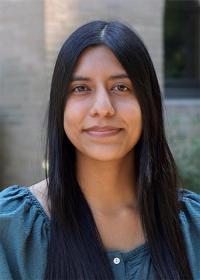What motivated you to pursue biostatistics? Are there any particular experiences, projects, or moments that influenced your decision?
I love hearing about how other people came to join the field! I discovered biostatistics when I joined a microbiology lab as an undergraduate. I began using a variety of tools in applied statistics in that lab which I hadn’t yet interacted with in my regular coursework. My time spent in that lab exposed me to the types of biological questions that could be answered with statistics, and I found myself wanting additional training and the chance to explore statistics in public health.
Why UW Biostatistics and not another university?
UW Biostatistics has a great reputation because of the quality biostatistical training they provide, which appealed to me. I was excited by the MS Capstone program design and the opportunity to gain experience with statistical theory and modeling through the courses offered here. The capstone project also appealed to me because of the chance to collaborate with fellow students and sponsors to solve an applied statistical problem in the field.
How would you describe your experience as a UW Biostatistics student? What’s been the most valuable part of the experience so far?
I’ve gained a lot from the program, mainly in terms of formal education, but also in exposure to opportunities with research and applications in biostatistics. The most valuable part of the program for me has been getting to interact with the work conducted by the department. Attending seminars, speaking with faculty, hearing about other student research, and taking part in my capstone project have all been encouraging ways to explore where biostatisticians are needed. There’s such amazing work being done by students and faculty alike, so getting a chance to see and be a part of that has been amazing.
What are your future plans?
I’m at an exciting point where I feel like there’s a lot within biostatistics that interests me and that I wish to explore. I have a lot of ideas in mind and haven’t quite settled on where I’ll land, but my experiences and training have given me a lot of hope and drive to partake in a position where my work can benefit others. In the long term, I’m hoping to become a biostatistician conducting informed and collaborative work.
What advice would you give to a student who is considering a UW Biostatistics program?
I would definitely consider the coursework and research opportunities offered by any program you’re looking into to see if they align with your interests and future career goals. If, like me, you are someone who wants the chance to explore and figure out where you might fit in the field, consider what UW can offer you and what excites you most about the program.
Additionally, applying to graduate school can be super overwhelming and there’s so much information to consider when deciding where to attend that I think it’s great to try to speak to current students to get a feel for the department and determine if it’s a good fit. Having a supportive environment and strong connections with those around you can make a huge difference in your time in a graduate program. I’ve so valued the connections I’ve made with other students at UW that have made transitioning to graduate schooling much easier.
Anything else you’d like people to know about you?
I’m a first-generation student, so I wanted to leave a small note of support for any students reading who might be in the same position! I don’t think I would have imagined myself in a graduate program prior to my experiences as an undergrad, but it was support that I received from fellow first-generation students during my undergrad that made it seem like a possibility. If you are in the same boat, know that I’m rooting for you, and you absolutely have what it takes to succeed. Having resources and fellow students to turn to has been really helpful for me in terms of navigating my time here.
Interested in earning your Master of Science in Biostatistics at the UW? Learn more about the MS Capstone Program and the MS Thesis Program

